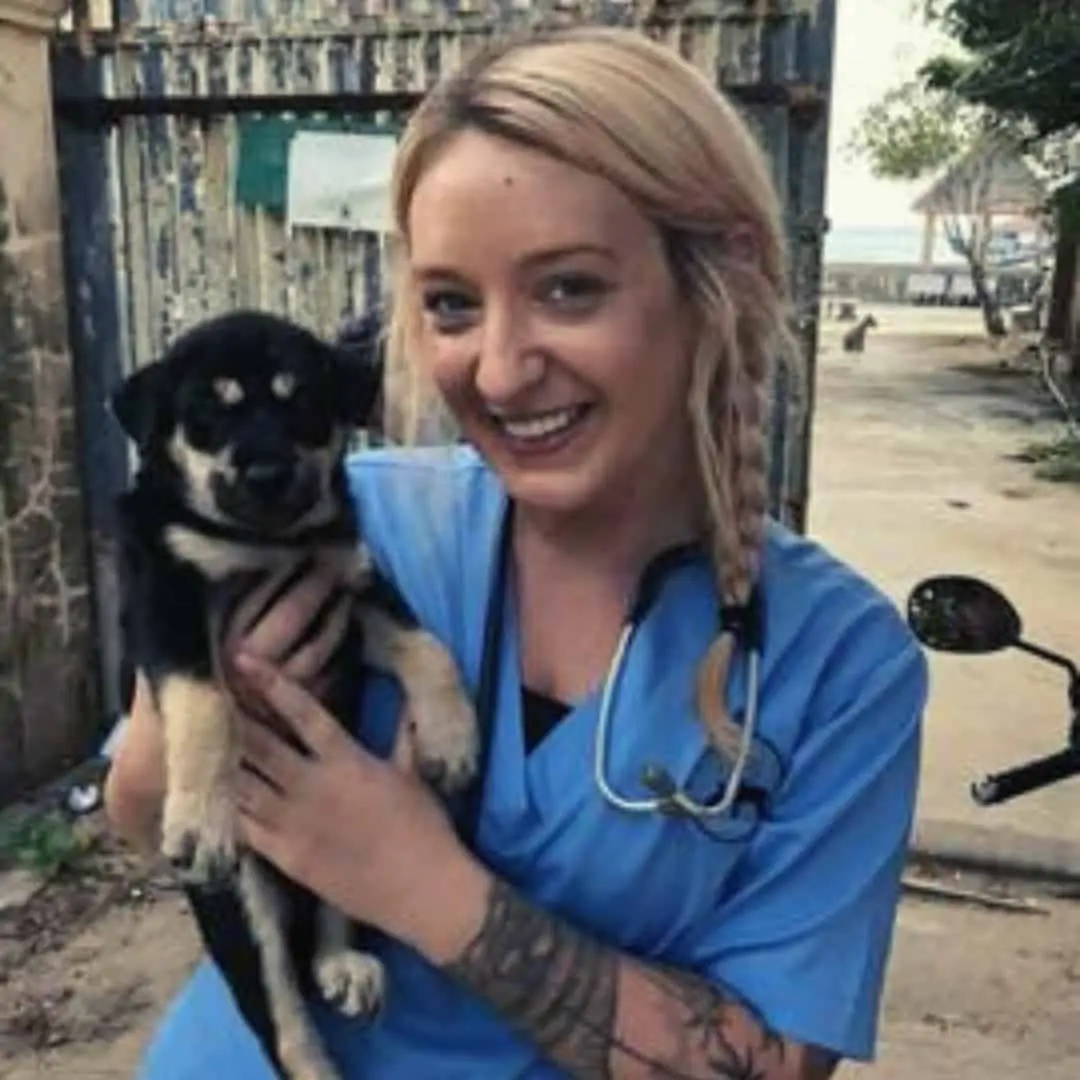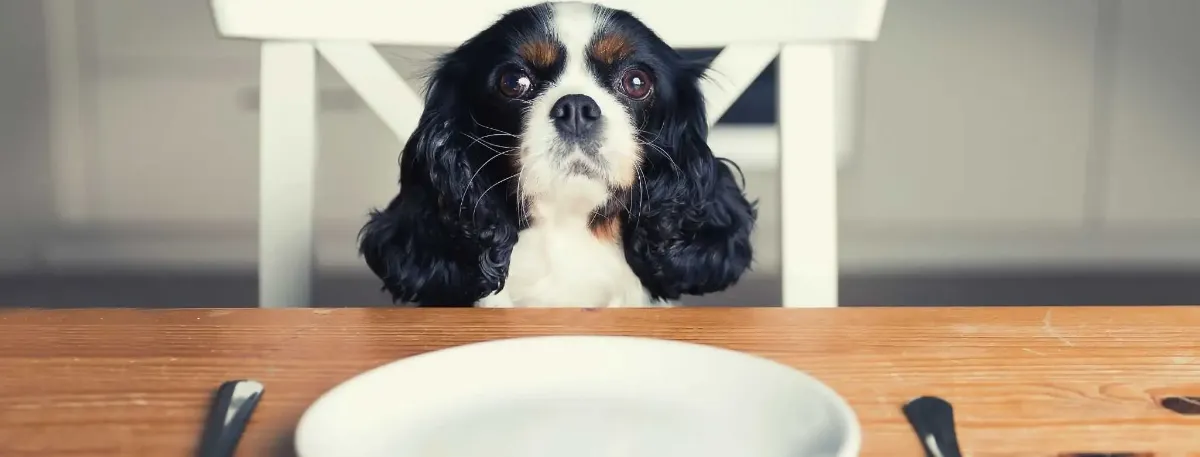
What can dogs not eat? Check out my detailed and updated 2022 guide about the topic.
Whether you have an indoor or outdoor dog, you can be sure he or she wants to eat what’s on your table. Although I support dogs eating dog food, sometimes some human food is allowed. However, if you don’t want to hurt your four-legged house friend, you might want to be aware of what can and can’t be given.
Some human foods are toxic to dogs. Some of them are okay, but only in moderation. And some can be given completely safely. There are also misconceptions about the topic that are worth clarifying. I will cover all three in this article.
- Dangerous and toxic foods for dogs
- Alcohol
- Almonds
- Avocado
- Cat food
- Chocolate
- Cinnamon
- Coffee and other caffeinated beverages
- Cooked bones
- Corn with the cob
- Dairy products
- Fat trimming
- Garlic
- Grapes
- Hops
- Human vitamins and medicines
- Liver
- Macadamia Nuts
- Marijuana
- Onion, chives, and leeks
- Peppers
- Peach, Persimmon and Plum
- Raw meat and fish
- Tomato and Rhubarb leaves
- Salt
- Sugar
- Xylitol
- Yeast
- Safe food for dogs from the table
- Foods that you can give your dog in moderation
- Misconceptions about giving human foods to dogs
- Summary
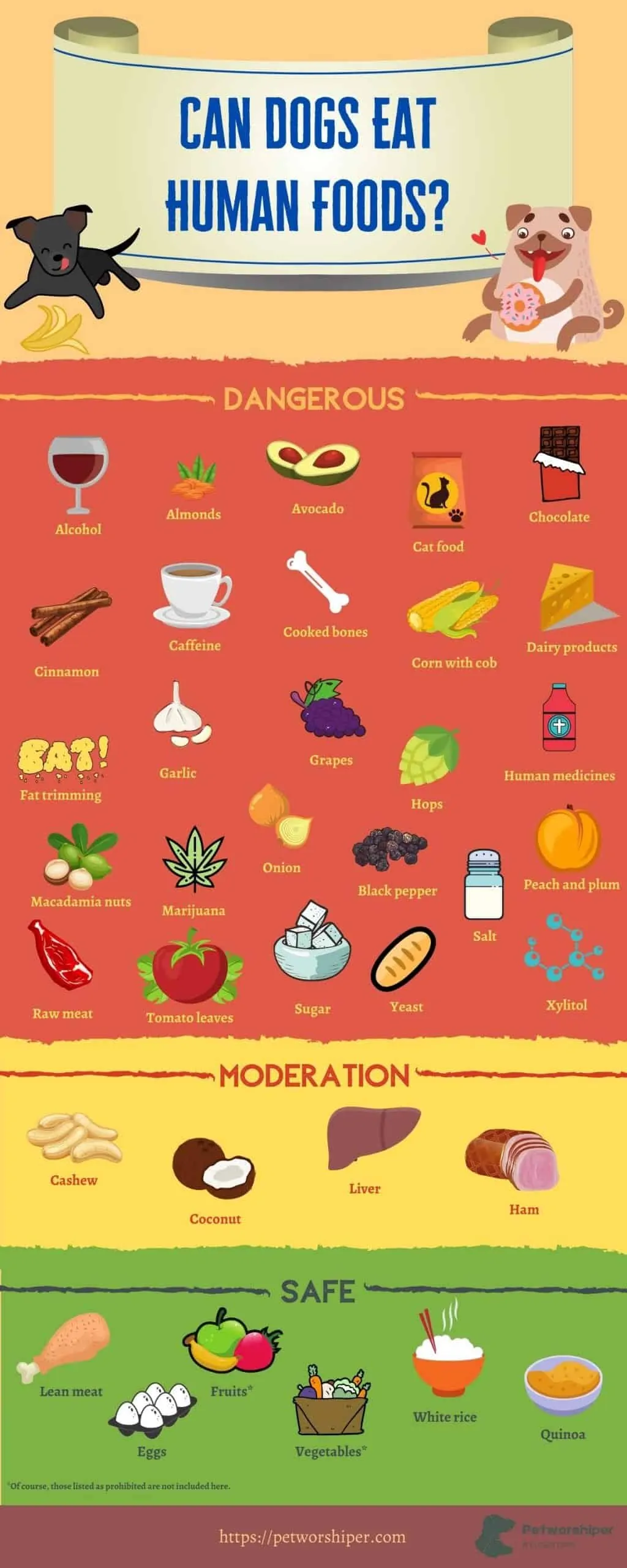
Finding the best diet for your dog is not easy. You have to consider several aspects, e.g., activity, breed, age, health condition, etc. If you want to make the best decision possible, check out my comprehensive guide on how to choose the best dog food.
Dangerous and toxic foods for dogs
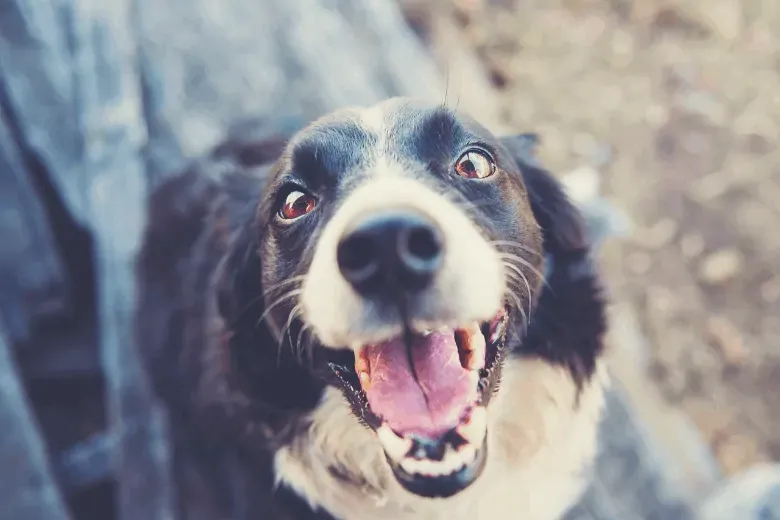
It is better not to give your canine the ones listed below. All of them are dangerous; some can even be fatal. You probably already knew about some, but I tried to gather them all.
Alcohol
Alcohol has a similar effect on dogs as it does on humans. However, dogs tend to tolerate it much worse, for example, because of their size. Under no circumstances should you give your dog alcohol. It can cause diarrhea, vomiting, problems with coordination, breathing problems, and coma.
Almonds
It’s not as dangerous as macadamia nuts, but be careful with almonds too. If not chewed properly, they can block your dog’s esophagus or the windpipe. The salted version is even worse because of the salt content.
Avocado
For many animals, avocados are extremely dangerous. It is most dangerous for birds and causes death quite often. Dogs tolerate it a little better, but it is not recommended to give it to them either. The problem is caused by persin, which causes vomiting and diarrhea even in small amounts. The avocado’s pit is full of persin, and it’s a choking hazard. Call your veterinarian immediately if your dog has swallowed it.
Cat food
The composition of cat food is completely different from that of dog food. If your dog consumes it regularly, he may have health problems.
Chocolate
Perhaps this is the best known of the list. Theobromine (methylxanthine) and caffeine in chocolate do not positively affect the nervous system and heart rate. These two substances, if dogs eat a lot of chocolate, can cause vomiting, diarrhea, restlessness, increased urination, tremors, increased heart rate, seizures, and death. The more cocoa the chocolate contains, the more dangerous it is for your puppy.
Cinnamon
While cinnamon is not toxic for dogs, you better omit it from your puppy’s diet. It can irritate the inside of dogs’ mouths so that they won’t chew comfortably. It can also lower dogs’ blood sugar too much, which can also cause health problems.
Coffee and other caffeinated beverages
As I mentioned above, caffeine is not good for your dog. It can cause hyperactivity, vomiting, high heart rate and blood pressure, other seizures, and even death.
Cooked bones
It is worth giving dogs a bone. It is healthy in many ways. It keeps their teeth clean, and they get a lot of nutrients from it. However, never give your dog boiled bones. It can be dangerous because it breaks and splinters into small, sharp pieces. It can cut your friend’s mouth or stomach. Also, it can cause many more health problems. Examples include choking, vomiting, broken teeth.
Corn with the cob
Corn alone is not dangerous to dogs. However, if you give your dog it along with the cob, that can cause a problem. The danger of suffocation and intestinal obstruction awaits your puppy.
Dairy products
Some dogs are lactose-intolerant. Listen to the signs, and if that proves to be the case, you should rather not give your puppy dairy products. Lactose can cause diarrhea and other indigestion in susceptible dogs.
Fat trimming
Although you may think your dog deserves it, please do not give him fat trimmings from leftovers. Fat trimmings can cause pancreatitis.
Garlic
Garlic, onions, chives, and leeks are part of the Allium family. However, garlic is five times more toxic than the others I mentioned. It can cause anemia by killing dogs’ red blood cells. A minimal amount shouldn’t be a problem. However, pay attention to your dog if he accidentally ate food that contained garlic.
Grapes
Grapes are extremely toxic to dogs. Even a tiny amount can harm them. It can cause kidney failure, so by no means give your puppy grapes. Of course, the same goes for raisins. Other symptoms that grapes can cause: vomiting, depression, low energy.
Hops
Although alcohol has already been discussed and hops are almost exclusively in beer, it is worth mentioning. Hops can cause vomiting, increased heart rate, fever, and even death.
Human vitamins and medicines
It is no coincidence that there is a separate version of these for dogs. Never give your own supplements or medicine to your dogs. Human supplements can contain amounts of vitamins and minerals that can even lead to an overdose in dogs. Prenatal vitamins, for example, contain dangerous amounts of iron for dogs. Products containing acetaminophen or ibuprofen can also be hazardous for dogs.
Liver
Giving your dog a liver can be a smart idea. It contains many useful nutrients. However, it contains a lot of vitamin A, which in large amounts is not good for your puppy.
Macadamia Nuts
Macadamia nuts are also dangerous. Already a few pieces of it can make your dog sick. Watch for these symptoms: muscle shakes, vomiting, increased temperature, and weak back legs. If your dog eats chocolate that contains macadamia nuts, the situation can be even worse.
Marijuana
My view is that this should not even be an issue. Do not give marijuana to your dog. There is not so much research on the subject. But experience has shown that dogs respond worse to this drug than humans. The most common symptoms are slow response times, dribbling urine, heart rate change, neurological stimulation, hyperactivity, coma, and even death.
Incidentally, there is another compound in marijuana called CBD. You can read my article about giving CBD to dogs.
Onion, chives, and leeks
Although they are not as toxic as garlic, it is better not to give them to your dog. They are dangerous to your little friend in every form.
Peppers
In general, colored peppers are edible for dogs. However, strong versions should be avoided, as should black pepper. Dogs are much less tolerant of these than humans.
Peach, Persimmon and Plum
You also need to pay attention to the quantity of these fruits. If your dog eats a lot of them, that can cause problems in his small intestine. And let’s not forget that peach and plum pits are choking hazards and contain cyanide.
Raw meat and fish
Raw meat and fish can contain bacteria that cause food poisoning. And some fish (especially salmon) may be full of parasites that can cause so-called “fish disease” or “salmon poisoning disease”. By cooking, however, both fish and meat can be safely given to dogs. However, if you want to give these to your dog raw, make sure you get them from a secure source.
Tomato and Rhubarb leaves
The edible parts of these plants are not dangerous. However, their green parts contain large amounts of oxalates, which are very toxic to dogs. Oxalates can cause drooling, vomiting, diarrhea, lethargy, weakness, tremors, and bloody urine. Be more careful that if your dog goes to the vegetable garden, he should not eat the tomato along with the green parts.
Salt
Too much salt can also be a problem for humans, and this isn’t different for dogs. Moreover, in many cases, they are even more sensitive to it. Too much salt can cause sodium ion poisoning, which can have several serious symptoms such as vomiting, diarrhea, depression, tremors, increased temperature, seizures, and even death.
Sugar
Too much sugar can lead to dental issues, obesity, and even diabetes. Always check the ingredients when you give something to your dog.
Xylitol
This sugar alcohol is found in a lot of sweets. You’re best off not giving your dog anything sweet at all. Or if you do, make sure this substance definitely not in that food. Xylitol is very poisonous for dogs. It can cause blood sugar, seizures, liver failure, and even death.
Yeast
Yeast is not good for dogs for two reasons. On the one hand, it can cause digestive problems in the dog’s belly. It can cause a lot of pain or gas. On the other hand, yeast forms alcohol in the stomach due to fermentation, which can lead to alcohol poisoning.
Safe food for dogs from the table
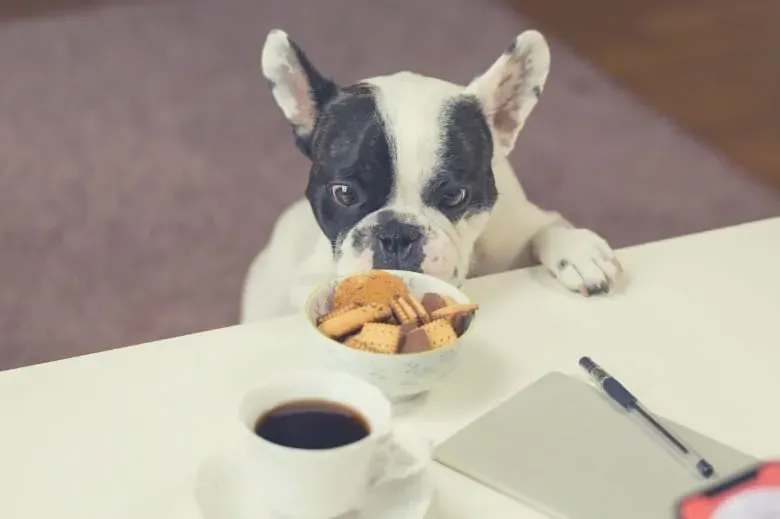
Of course, there is a lot of human food that can be safely given to dogs. Since there are far more of these than the dangerous ones, I won’t list them all, but I’ve gathered quite a few.
Lean meat
If you remove bone and excess fat from meat, there can be no problem. This also includes too thick fatty skin.
Eggs
Eggs are a great source of protein and contain many valuable nutrients and vitamins for your dog. However, be careful not to serve it raw. This will prevent salmonella infection. Leave the seasoning as well.
Fruits
You can safely give most of your fruit to your dog. Examples of such fruits are:
- bananas
- apple slices
- strawberries
- blueberries
- watermelon
- cantaloupe
- cranberries
- mangoes
- oranges
- peaches
- pears
- pineapples
- raspberries
If possible, give these to your dog without seeds. This will prevent suffocation or various stomach problems.
Vegetables
Vegetables are very healthy, even for your canine friend. They can even be used as a treat. The following vegetables are safe for dogs:
- broccoli
- brussels sprouts
- carrots
- celery
- cucumber
- green beans
- peas
- cooked potatoes
- spinach
- sweet potatoes
White rice
Many people recommend cooked rice for dogs who have stomach problems. It solidifies the stool and, along with cooked chicken, feeds the dog properly.
Quinoa
Quinoa is an important ingredient in a lot of dog food. It can be a great alternative to rice, corn, wheat, and soy.
Foods that you can give your dog in moderation
Some foods don’t cause a problem for your puppy, but you still need to pay attention to the quantity.
Cashews and peanuts
Dogs can eat cashews and peanuts. These are great sources of calcium, magnesium, antioxidants, and protein. However, they are high in calories and fat, so large amounts can cause obesity and other problems.
Coconut
The lauric acid in it helps fight bacteria and viruses. It also helps with various skin conditions and bad breath. Do not give the furry outside of the shell to your dog.
I have a related article about coconut oil for dogs. Check it out if you are interested.
Ham
Ham is not the healthiest food, but it is edible for dogs. Although it should not be a regular meal due to the salt, it contains.
Misconceptions about giving human foods to dogs
The internet can be beneficial as a lot of information is available. However, there are many misconceptions, and it is worth separating them from the facts.
Of course, there are also a few misconceptions about the topic of this article. The following foods are rumored not to be given to dogs. However, this is not necessarily true.
Apple cores and seeds
Of course, none of us would give our dogs these separately. However, you don’t even have to cut it from the apple.
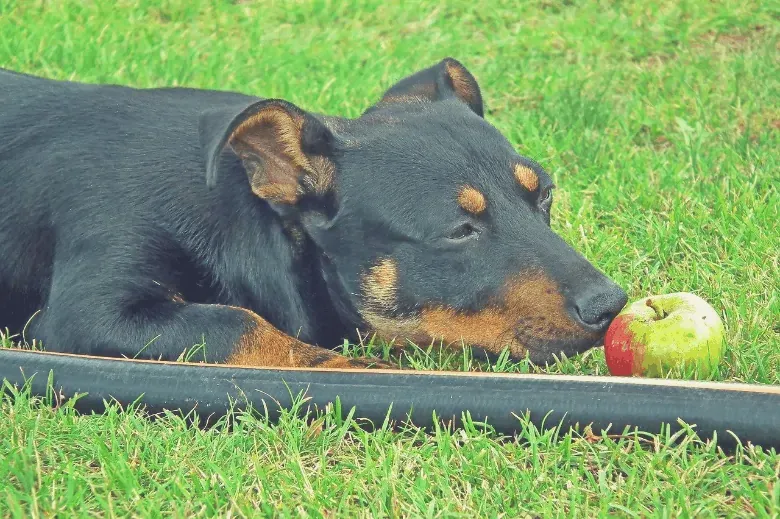
Yes, apple seeds contain cyanide. Virtually every plant contains toxins at some level. If these are below a certain level, your dog will have nothing wrong with it. A medium-sized dog would have to eat about 85 grams of apple seeds completely chewed to make it toxic to him or her.
This means a lot of apples that your dog will definitely not eat at once. Also, if your dog’s liver is working well, the toxins will not accumulate. Apples can be safely eaten with kernels and seeds.
Pork
Surely everyone has heard this “fact” that dogs should not be fed pork. This is usually justified by the following: porks are fatty, eat disgusting things, and contain some mystery component that is toxic for dogs.
Although none of these are genuine claims, pork is less fatty than beef. A well-kept pig doesn’t necessarily eat disgusting things. Or if so, why do we humans eat?
There is nothing in the pork that would have any negative effect on our puppy. There is little chance our dog will be allergic to it.
Plenty of manufacturers put pork in their dog food, which could not happen if pork really negatively affected.
Grains
Of course, many dogs are allergic or sensitive to grains. As sometimes, this can happen with meat too. The truth is, your dog can safely eat wheat, corn, soy if it doesn’t cause a problem.
Related “Can Dogs Eat” Guides:
Summary
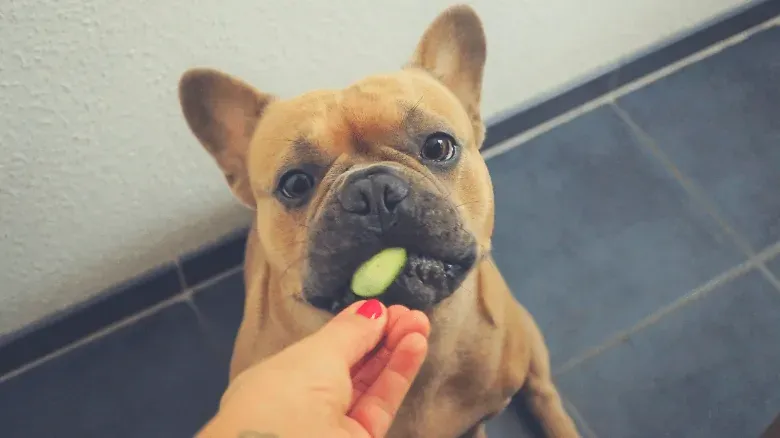
Although I tried to include everything in the lists, I may have missed something. It is best to do your own research on the topic as well. Or the other one I emphasize every time: Talk to your vet!
The metabolism of animals can be very different from that of humans. That’s why it’s not worth risking just because your puppy looks nice on you. We save our dogs’ health by paying attention to them and giving them what does best for them.
If you want to avoid the above problems anyway, the best way to do that is to feed your pup with dog food. A high-calorie dog food, for example, can be helpful.

